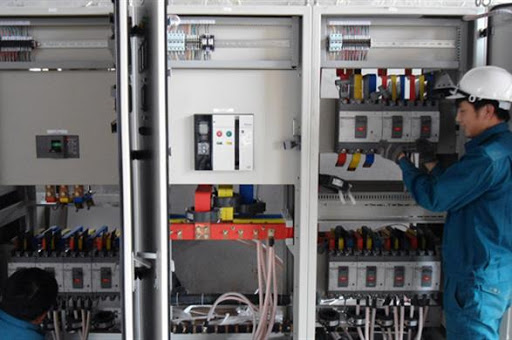Skills Requirements for the Industrial Electrical Sector at College Level
Circular 48/2018/TT-BLDTBXH issued by the Ministry of Labor, Invalids, and Social Affairs stipulating the minimum amount of knowledge and competency requirements that learners must achieve after graduating from intermediate level, college level in the fields of electrical engineering, electronics, and telecommunications will take effect from February 10, 2019.

Required skills for the industrial electrical industry at the college level - Illustrative photo
In the Regulations on minimum knowledge volume and competency requirements that learners must achieve upon graduation at intermediate and college levels in the industrial electrical sector, issued together with Circular 48/2018/TT-BLDTBXH, the minimum skills required upon graduation in the industrial electrical industry at the college level are specified as follows:
- Able to read conventional symbols on electrical drawings;
- Able to calculate, wind, and complete small capacity transformers as required;
- Skilled in installing safety protection systems in industrial and residential settings;
- Able to identify, select, and use common electrical materials according to Vietnamese and IEC standards;
- Able to organize and implement occupational safety, industrial hygiene, and properly perform first aid for electric shock victims;
- Able to identify and classify various types of electrical materials, electrical equipment, and basic electric devices;
- Able to select electrical materials, electrical equipment, and basic electric devices;
- Able to assemble and disassemble various types of electrical materials and electrical equipment;
- Able to measure basic parameters and quantities of electrical circuits;
- Able to calculate technical parameters in DC, AC, and three-phase AC circuits in steady-state and transient conditions;
- Able to draw and analyze stator winding diagrams of single-phase and three-phase induction motors;
- Able to calculate and rewind single-phase and three-phase motors based on available data;
- Able to calculate parameters and wind small capacity transformers as required;
- Able to install, operate, maintain, repair, and troubleshoot electrical machines as required;
- Able to disassemble and repair electrical equipment according to manufacturer's specifications;
- Able to identify and repair household electrical appliances according to manufacturer standards;
- Able to install household lighting systems based on design drawings;
- Able to establish and control ISO processes in workshops or factories;
- Able to install and repair starting and stopping circuits for three-phase, single-phase motors, and DC motors;
- Able to assemble protection and signal circuits;
- Able to assemble and repair electrical circuits for metal cutting machines such as drilling, lathe, milling, planing, grinding machines, and production machines like cranes, elevators, and electric furnaces;
- Able to assemble and install sensor circuits;
- Able to repair and replace sensor circuits;
- Able to calculate and select wires and arrange electrical systems suitable for working conditions and usage purposes in buildings, workshops, or factories;
- Able to calculate and select grounding and lightning protection for power lines and structures suitable for working conditions according to TCVN and IEC electrical standards;
- Able to install power supply lines for a building or workshop that meet the requirements and standards;
- Able to calculate and select suitable electric motors for a non-adjustable and adjustable electric drive system;
- Able to identify components on electrical circuit diagrams and in reality. Draw and analyze basic electrical circuit diagrams using electronic components;
- Proficient in using measuring equipment to test and check electronic components, circuit components, and circuit parameters;
- Skilled in soldering and assembling electronic circuits;
- Able to check the quality of power electronic components in maintenance and replace basic power electronic components;
- Proficient in connecting PLC with PC and peripheral devices;
- Able to write programs for different types of PLCs meeting technical requirements;
- Able to assemble and repair pneumatic control circuits in industrial applications such as product sorting lines and lifting systems;
- Able to operate circuits according to specified principles and procedures;
- Able to make a reasonable maintenance plan, ensuring safety and industrial hygiene;
- Able to design SCADA applications in industrial control systems;
- Able to program and supervise control systems in industrial applications;
- Able to assemble and disassemble sensors and elements in automation systems, replace and calibrate components;
- Proficient in using basic information technology as required; capable of exploiting, processing, and applying information technology in the specialized work of the industry and profession;
- Proficient in using basic foreign languages, achieving level 2/6 in the Vietnamese Foreign Language Competency Framework; able to apply foreign languages in specialized work of the industry and profession.
Details at Circular 48/2018/TT-BLDTBXH, issued on December 28, 2018.
Le Vy
- Responsibilities of officials of the Ministry of Finance of Vietnam when they are issued Official Passports from November 19, 2024
- 06 solutions to enhance the effectiveness of social policy credit in the new phase in Vietnam
- Financial support level for the purchase and repair of transportation vehicles for the Economic - National Defense Corps in Vietnam from December 30, 2024
- Financial support levels for purchasing and repairing of medical equipment for the Economic - National Defense Corps in Vietnam from December 30, 2024
- Latest regulations on management and use of passports for officials and public employees of the Ministry of Finance of Vietnam
- New regulations on the procedures for veterinary sanitation inspection in Vietnam from January 6, 2025
-

- Responsibilities of officials of the Ministry ...
- 16:00, 23/11/2024
-

- 06 solutions to enhance the effectiveness of social ...
- 15:32, 23/11/2024
-

- Guidelines for registration and organization of ...
- 11:53, 23/11/2024
-

- Contents of audit service quality control in Vietnam
- 11:00, 23/11/2024
-

- Acts in violation of Law on Independent Audit ...
- 10:30, 23/11/2024
 Article table of contents
Article table of contents
